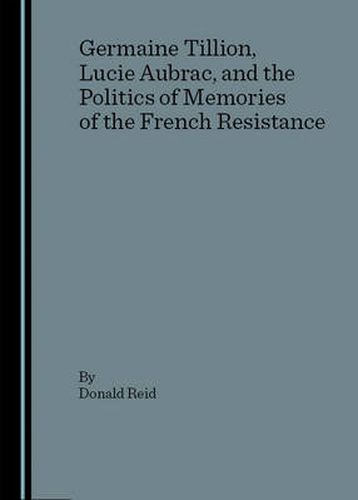Readings Newsletter
Become a Readings Member to make your shopping experience even easier.
Sign in or sign up for free!
You’re not far away from qualifying for FREE standard shipping within Australia
You’ve qualified for FREE standard shipping within Australia
The cart is loading…






Germaine Tillion, Genevieve de Gaulle Anthonioz, Lucie Aubrac, and Raymond Aubrac were among a small number of French men and women who made the decision to resist early in the Occupation. In the summer of 1940, Marc Bloch analyzed the society in which he lived in order to identify and affirm allegiance to a France truly at odds with that which was taking shape in Vichy. Bloch died in the Resistance, but his life would take on new meanings in the collective memories of postwar France. Confrontation with the Aubracs’ account of their refusal to accept the unacceptable became another important way the French engaged with the Resistance and its legacy. The acts Tillion took during the French-Algerian War and de Gaulle Anthonioz took when confronted with poverty in the France of the trentes glorieuses, were of a piece with the radical nature of their earlier decision to resist.
Evocation of the Resistance provided a basis for France to reconstitute itself with honor after the war. Yet memory of the Resistance could also pose difficult issues for future generations. Those who came of age in 1968 grappled with the memory of the intrepid resisters of the first years of the war, whose decision to resist stood as an inspiration and a challenge. Historians, with the imperative to take the mandate to narrate the past from historical actors, to make resisters figures of history, developed complex relationships with those who had resisted. The essays in this collection address how resisters made sense of the wartime and postwar world in terms of their resistance, and how others made sense of the Resistance itself and its legacy by engaging with resisters and their histories.
$9.00 standard shipping within Australia
FREE standard shipping within Australia for orders over $100.00
Express & International shipping calculated at checkout
Germaine Tillion, Genevieve de Gaulle Anthonioz, Lucie Aubrac, and Raymond Aubrac were among a small number of French men and women who made the decision to resist early in the Occupation. In the summer of 1940, Marc Bloch analyzed the society in which he lived in order to identify and affirm allegiance to a France truly at odds with that which was taking shape in Vichy. Bloch died in the Resistance, but his life would take on new meanings in the collective memories of postwar France. Confrontation with the Aubracs’ account of their refusal to accept the unacceptable became another important way the French engaged with the Resistance and its legacy. The acts Tillion took during the French-Algerian War and de Gaulle Anthonioz took when confronted with poverty in the France of the trentes glorieuses, were of a piece with the radical nature of their earlier decision to resist.
Evocation of the Resistance provided a basis for France to reconstitute itself with honor after the war. Yet memory of the Resistance could also pose difficult issues for future generations. Those who came of age in 1968 grappled with the memory of the intrepid resisters of the first years of the war, whose decision to resist stood as an inspiration and a challenge. Historians, with the imperative to take the mandate to narrate the past from historical actors, to make resisters figures of history, developed complex relationships with those who had resisted. The essays in this collection address how resisters made sense of the wartime and postwar world in terms of their resistance, and how others made sense of the Resistance itself and its legacy by engaging with resisters and their histories.